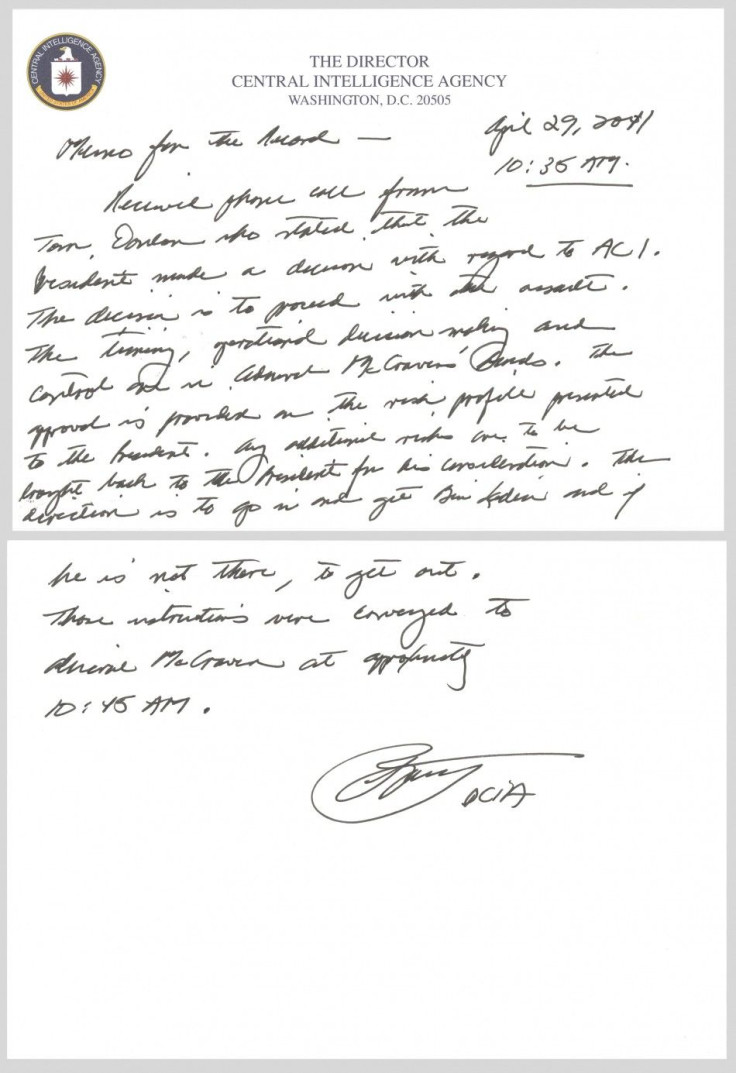CIA Memo Released: Obama Relied On Admiral Bill McRaven To Kill Bin Laden [TRANSCRIPT]

A memo from former CIA Director Leon Panetta, which confirms President Barack Obama's decision to proceed with the mission to hunt down Osama bin Laden, has been released by Time Magazine. The publication of this handwritten note commemorates the one-year anniversary of the death of the al-Qaida leader and mastermind of the September 11, 2001 terrorist attacks.
The memo, written in accordance with CIA protocol, states that Panetta received a call from National Security Officer Tom Donilon confirming that President Obama had made the decision to proceed with the assault on bin Laden's compound in Pakistan after assessing a risk profile.
The direction is to go in and get bin Laden and if he is not there, get out, said the memo. It does not clarify whether the intention was to kill bin Laden or to capture him.
The memo also shows that Obama was not in charge of operation strategy as the mission was being carried out. Panetta noted that the timing, operational decision making and control are in Admiral McRaven's hands.
Two days after the memo was penned, bin Laden was shot dead in Pakistan by a team of Navy SEAL commandos.
McRaven was stationed in Afghanistan when he led the raid on Osama bin Laden's compound in Abbottabad, Pakistan early on May 2, 2011. (It was May 1 on the U.S. East Coast at the time.) He communicated electronically with Panetta, who was at CIA headquarters in Virginia. I kept asking Bill McRaven, 'O.K., what the hell's this mean?' said Panetta later to Time Magazine.
The successful mission involved about 40 troops, most of whom rappelled into bin Laden's sprawling compound from helicopters shortly after midnight. The al-Qaida leader was found with his youngest wife in a bedroom on the third floor. The firefight was intense; three men and one woman died in addition to bin Laden. One of the men who died was a courier, whose movements had been monitored by the CIA; he had unknowingly helped American intelligence locate bin Laden's compound.
Obama's three wives, who were all present during the raid, survived. They were placed under unofficial house arrest in Pakistan after the raid, and were eventually sentenced to a short prison term for residing in the country illegally. They were deported from Pakistan on April 26.
Following the raid, Pakistan's government claimed it had no knowledge of bin Laden's presence in Abbottabad. But questions have surfaced as to how the terrorist's presence in the giant compound could have gone undetected by Pakistani officials. Abbottabad is home to a major Pakistani military base, and only about 30 miles from the capital city of Islamabad.
DNA testing and facial recognition were used to confirm the identity of bin Laden; his corpse was later buried at sea.
When news of bin Laden's death reached U.S. officials on May 1, said Panetta, all the air we were holding came out.
Admiral Bill McRaven earned a rank promotion for his work on the mission; he is now a four-star admiral. He was actually in charge of the military operation that went in and got bin Laden, said Panetta.
McRaven is a Navy SEAL and the commander of the Special Operations Command of the U.S. Navy. He has a history of strong leadership throughout his 36-year career in the military, including service as a task unit commander during Desert Storm and Desert Shield.
McRaven, who studied journalism at the University of Texas in Austin while participating in the Navy ROTC program, is the author of Spec Ops, a book about the theory and practice of special operations warfare. He is headquartered at the MacDill Air Force Base in Florida, according to his military biography.
In naming the commander who carried out the successful mission, Panetta's scrawled memo is more than a historical memento. It reminds us to recognize the Navy SEALS who risked their lives to hunt down the world's most wanted terrorist.
CIA Memo Transcription:
Memo for the Record - April 29, 2011 10:35 AM.
Received phone call from Tom Donilon who stated that the president made a decision with regard to AC1. The decision is to proceed with the assault. The timing, operational decision making and control are in Admiral McRaven's hands. The approval is provided on the risk profile presented to the president. Any additional risks are to be brought back to the president for his consideration. The direction is to go in and get Bin Laden and if he is not there, to get out. Those instructions were conveyed to Admiral McRaven at approximately 10:45 a.m.
Leon Panetta, CIA
© Copyright IBTimes 2024. All rights reserved.






















